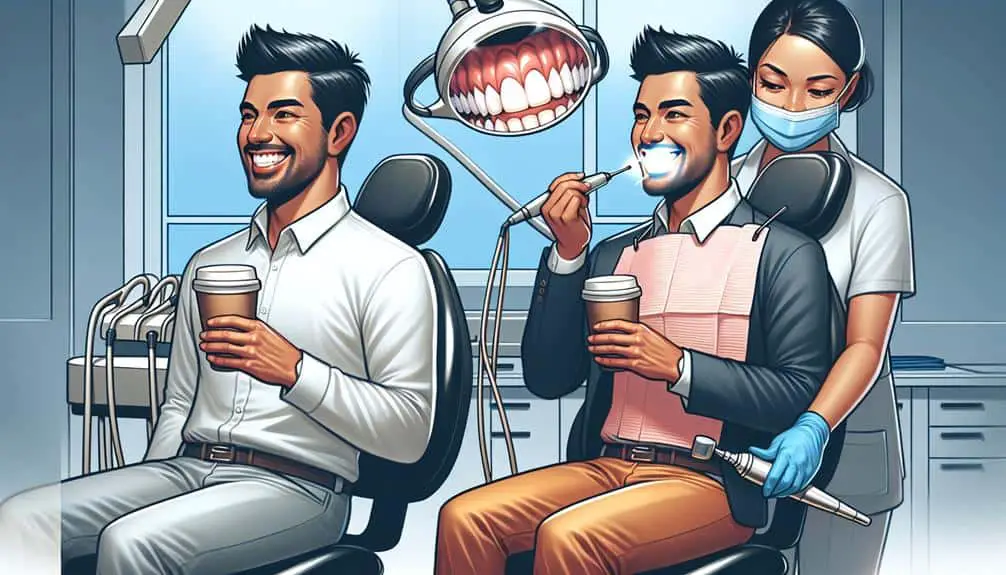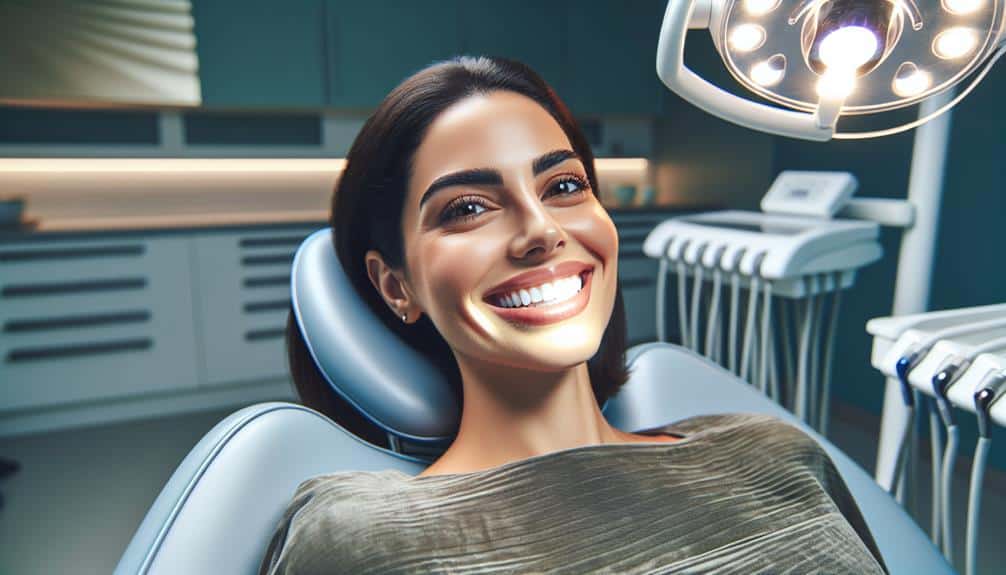To remove coffee stains effectively with laser teeth whitening, consider the benefits of this cutting-edge solution. The procedure involves targeting discolored areas with a specialized laser for a brighter, rejuvenated smile in just one session. Professional treatments are recommended for stubborn discoloration, and a protective barrier shields gums during the process. Laser energy effectively breaks up pigmented molecules, providing lasting results.
Maintain your brightened smile by avoiding staining foods and beverages, practicing good oral hygiene, and incorporating teeth-friendly fruits and vegetables. Take advantage of home remedies like baking soda and hydrogen peroxide to help preserve your teeth's whiteness. Get ready for a brighter smile with laser teeth whitening.
Key Points
- Laser teeth whitening effectively removes coffee stains with specialized laser technology.
- Professional treatments recommended for stubborn discoloration caused by coffee.
- Application of protective barrier shields gums during the stain removal process.
- Laser energy breaks up pigmented molecules for quick and lasting results.
- Maintain results by avoiding staining foods, practicing good oral hygiene, and using home remedies.
Benefits of Laser Teeth Whitening
Laser teeth whitening offers a highly effective and efficient method for removing stubborn stains caused by coffee consumption. The procedure works by using a specialized laser that targets the discolored areas on your teeth, breaking down the pigment molecules and restoring your teeth to their natural whiteness. One of the primary benefits of laser teeth whitening is the instant results it provides. Unlike traditional whitening methods that may take multiple sessions to see noticeable improvements, laser treatment can achieve significant whitening in just one session.
Furthermore, laser teeth whitening is a painless treatment. The laser energy used during the procedure is gentle on your teeth and gums, minimizing discomfort and sensitivity commonly associated with other whitening techniques. This makes it a preferred choice for individuals looking for a quick and comfortable way to remove coffee stains and enhance their smile. With laser teeth whitening, you can enjoy a brighter, stain-free smile without enduring prolonged treatments or experiencing unnecessary pain.
Procedure for Coffee Stain Removal
To effectively remove coffee stains from your teeth, the procedure involves targeting the discolored areas with a specialized laser that breaks down pigment molecules, restoring your teeth to their natural whiteness.
Home remedies like baking soda or hydrogen peroxide can help reduce stains, but for more stubborn discoloration, professional treatments such as laser teeth whitening are recommended.
During the professional procedure, a protective barrier is applied to your gums to shield them from the laser. The dentist then uses a laser device to emit energy onto the stained areas, breaking up the pigmented molecules. The laser's energy activates the whitening agent already applied to your teeth, enhancing the stain removal process.
The procedure is quick and efficient, with noticeable results after just one session. The laser targets the specific areas affected by coffee stains, ensuring a more focused and effective treatment compared to home remedies.
Professional treatments offer lasting results and are a safe way to achieve a brighter, stain-free smile.
Maintenance Tips for Lasting Results
For lasting results after laser teeth whitening, it's important to follow proper maintenance tips to preserve your newly brightened smile. Preventive measures are vital to avoid re-staining your teeth. Aftercare involves avoiding foods and beverages that are known to cause staining, such as coffee, tea, red wine, and dark sodas. Additionally, practicing good oral hygiene by brushing your teeth at least twice a day and flossing daily can help maintain your whitened teeth.
Diet changes play a significant role in maintaining your newly whitened teeth. Consider incorporating more fruits and vegetables that can naturally help clean your teeth, such as apples, carrots, and celery. These foods can help remove surface stains and plaque, contributing to a brighter smile. Home remedies like using baking soda and hydrogen peroxide as occasional toothpaste alternatives can also aid in preserving your teeth's whiteness.
Frequently Asked Questions
How Long Does the Laser Teeth Whitening Procedure Typically Take to Remove Coffee Stains?
Laser teeth whitening typically takes 30-60 minutes to remove coffee stains. The procedure is cost-effective in the long run. Pain management is minimal, and aftercare includes avoiding staining foods. Follow post-treatment guidelines for best results.
Are There Any Potential Side Effects or Risks Associated With Laser Teeth Whitening for Coffee Stain Removal?
When considering laser teeth whitening to remove coffee stains, you should be aware of potential risks like gum sensitivity and temporary tooth sensitivity. However, the benefits in treatment duration and effectiveness often outweigh these concerns.
Can Laser Teeth Whitening Effectively Remove Deep-Set Coffee Stains That Have Been Present for a Long Time?
To effectively remove deep-set coffee stains, consider prevention methods like reducing coffee consumption and using a straw. Home remedies such as baking soda and hydrogen peroxide can help lighten stains. Consult with a dentist for professional treatments.
Is Laser Teeth Whitening Safe for Individuals With Sensitive Teeth or Gums When Removing Coffee Stains?
Laser teeth whitening can be safe for individuals with sensitivity concerns and gum health issues when removing coffee stains. Protective measures like desensitizing gels and precise laser settings can help minimize discomfort and potential gum irritation.
How Often Should Someone Undergo Laser Teeth Whitening for Coffee Stain Removal to Maintain Results Long-Term?
To maintain long-term results with laser teeth whitening for coffee stain removal, you should undergo sessions every 6-12 months. Consistent oral hygiene, including brushing, flossing, and regular dental check-ups, can also help prevent stains and guarantee lasting effects.



